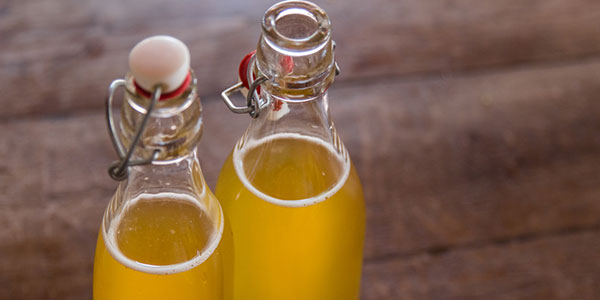
Getting to Know Kombucha
Kombucha is comparable to a sweetened tea, but with offered fizz and a unique, semi-sour flavor. But behold, kombucha varies greatly from standard black and green teas, with the disparity lying in its fermentation process. Fermented with a SCOBY (Symbiotic Culture of Bacteria and Yeast), the cultures modify both taste and benefits kombucha is acknowledged for. Though the taste is not desired by all, kombucha enthusiasts may profit from its associated health benefits: improved gut health, strengthened immune system, boosted energy, reduced chronic disease, and lost weight. Find a more detailed insight of kombucha's health benefits and truths here. With such inviting and desirable benefits, how do you choose and buy the best kombucha?
What to Look For
Just because the word "kombucha" is slapped on a product label, does not indicate the best kombucha in the market. When looking for the best kombucha, consider the...
...packaging. One, if not the most, greatest things about kombucha falls onto its robust probiotic content. Some of the best kombucha comes in darker bottles to protect the precious probiotics against light, as it may damage or destroy the bacteria. But in addition to the color, choose a glass bottle. Plastic or stainless steel may become degraded by the probiotic cultures; in turn, causing the material to leach into the beverage. Dark, glass kombucha bottles best withstands and protects the valuable probiotics.
...sugar content. Well, added sugars. Kombucha would not be kombucha without the presence of sugar, as it is required to initiate and feed the fermentation process. Despite natural occurring sugar in kombucha, stay suspicious on added sugars that may appear. As a general guideline, if kombucha is listed to have more than four sugars on the nutrition facts label, it may contain added sugar following the fermentation process.
...natural ingredients. Like any food or beverage product, artificial ingredients may be added to enhance flavor and stabilization. And though kombucha is perceived as healthful, it still may contain unwanted ingredients. Look for kombucha products naturally flavored with herbs and spices. Juice may additionally be added, but will also raise the sugar content.
...presence of alcohol. This is mainly a personal preference, not necessarily a recommendation. The fermentation process of kombucha often requires the need to label whether or not alcohol is contained. The Food and Drug Administration (FDA) claims products more than 0.5 percent draws the line between alcohol-containing and non-alcoholic products.
The above characteristics mostly drive the best qualities of kombucha and are not necessarily requirements, but rather suggestions. While not well-documented, a high intake of kombucha may cause adverse effects (such as gas and bloating), mostly related to probiotic content, though its high acidity has also been warned with caution. At this time, there is no established intake on both kombucha and probiotics. Until more is known regarding consumption recommendations, drink in moderated amounts. If experiencing adverse reactions, reduce its intake and experiment with dosages. Additionally, some kombucha products may present with a higher alcohol content than others which requires the attention for children, pregnant and lactating women, and seniors. A healthcare professional can further guide personal recommendations for safe consumption. But all-in-all, kombucha can be a unique, healthful beverage added to your diet!






